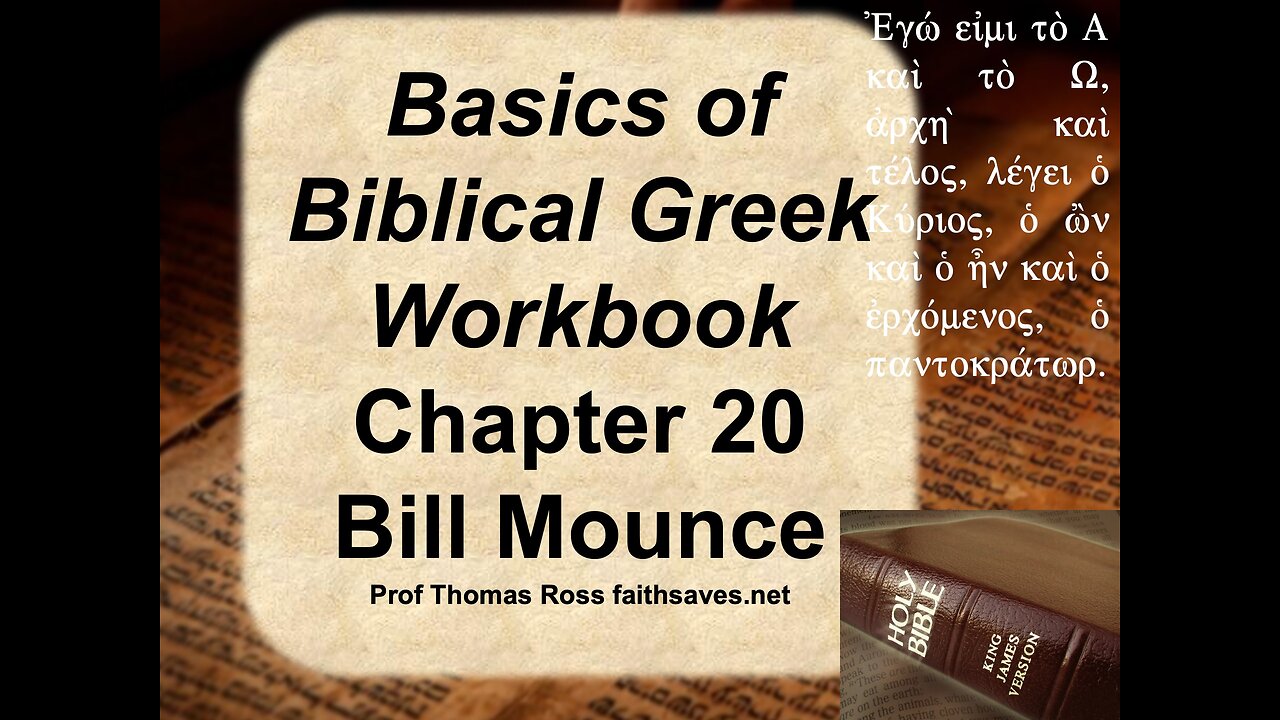Premium Only Content

New Testament / Koine Greek class #24: Basics of Biblical Greek Workbook, William Mounce, chap 20
Lecture 24 in New Testament or Koine Greek, covers the exercises in chapter 20 of William (Bill) Mounce’s Basics of Biblical Greek textbook, covering verbal roots and other forms of the future tense. The following passages are translated:
Warm up:
α. John 12:48; β. Matthew 24:5; γ. Mark 16:17; δ. (John 8:32); ε. Luke 12:19; ζ. —; η. Mark 4:13;
Translation:
1. Mark 1:8; 2. Matthew 13:41; 3. Mark 16:7; 4. John 14:23; 5. Matthew 1:21; 6. 1 Corinthians 6:2-3; 7. (John 11:48); 8. 1 Corinthians 15:35; 9. Luke 19:22; 10. Luke 11:49
Additional Exercises:
11. —; 12. —; 13. (Isaiah 58:13, LXX); 14. (Joshua 22:22, LXX); 15. Epistle of Barnabas 11:5; 16. Revelation 2:23; 17. 2 Clement 4:1; 18. Matthew 5:8; 19. James 2:18-19; 20. John 15:10.
In relation to Mark 1:8 (Exercise 1), the reason for translating ἐν ὕδατι as, in this passage "with water" rather than "in water," are:
The translation of the Authorized Version that Christ “shall baptize you with the Holy Ghost” (Matthew 3:11, etc.) is superior in its particular context to a rendering of βαπτίσει ἐν Πνεύματι Ἁγίῳ, as “he shall baptize you in the Holy Ghost.” A comparison of the gospel texts on Spirit baptism indicate that both the simple dative and the dative with en specify the same category of usage in the text. For example, in Luke 3:16 the dative ὕδατι parallels ἐν Πνεύματι Ἁγίῳ καὶ πυρί. Acts 1:5 likewise parallels John’s baptism ὕδατι with baptism ἐν Πνεύματι Ἁγίῳ. Note also the simple dative πυρί in Matthew 3:12 and Luke 3:17.The simple datives are best taken as examples of a “dative of means/instrument [by, by means of, with] ... [where] the dative substantive is used to indicate the means or instrument by which the verbal action is accomplished. This is a very common use of the dative, embracing as it does one of the root ideas of the dative case (viz., instrumentality) ... before the noun in the dative, [one should] supply the words by means of, or simply with.” While the instrumental dative is very common, there is a great “scarcity of ... usage [for the] ... locative of place without a preposition ... [so that the grammarian] Blass indeed remarks that the ‘local dative’ does not occur in the N. T.” If there are few simple datives representing a dative or locative of place in New Testament Greek, or perhaps none at all, but the instrumental idea for the dative form without a preposition is very common, then the presumption that the baptisms in Matthew 3 and the parallel passages are “with” water, “with” the Holy Ghost, and “with” fire, rather than “in” these three, is very strong. Similarly, ἐν Πνεύματι constitutes a use of ἐν with the dative indicating instrument or means. Thus, in Spirit baptism “Christ is the agent ... and the Holy Spirit is the means ... that the Lord uses to baptize ... Πνεύματι Ἁγίῳ clearly indicates means in Mark 1:8 (as in several other passages dealing with Spirit-baptism).” Furthermore, ἐν Πνεύματι regularly possesses the sense of means or instrumentality in the LXX; the locative idea of sphere is significantly less common. Indeed, the locative sense is not clearly present in any passage in the Greek Old Testament where en pneumati refers to the Holy Spirit. The related ἐν πυρί (cf. Matthew 3:11, βαπτίσει ἐν Πνεύματι Ἁγίῳ καὶ πυρί) also very frequently possesses the sense of instrumentality or means in the LXX. However, such metaphorical language for Spirit baptism does not exclude any locative sense in Spirit baptism, nor does Christ’s pouring out the Holy Ghost from heaven, which resulted in Spirit baptism, exclude the Spirit’s “fill[ing] all the house where [the 120 in the church] were sitting” (Acts 2:2) and thus immersing the church in His overwhelmingly powerful presence. Nevertheless, syntax and context demonstrate that the rendering of the Authorized Version and of English Bibles back to Tyndale is correct-Christ performs Holy Ghost baptism with the Spirit. (from Spirit Baptism: a Completed Historical Event: An Exposition and Defense of the Historic Baptist View of Spirit Baptism, at the FaithSaves website; see references for the quotations there).
Also, nonarticular Πνεῦμα Ἅγιον is still "the" Person of the Holy Spirit, the third member of the Godhead. Πνεῦμα Ἅγιονis a monadic noun phrase, referring specifically to the Person of the Holy Spirit in the Trinity, and thus, like other monadic nouns, and in a fashion like that of proper names, it is definite without the article. Daniel Wallace wrote: “A one-of-a-kind noun does not, of course, require the article to be definite (e.g., “sun,” “earth,” “devil,” etc.). One might consider Πνεῦμα as monadic when it is modified by the adjective Ἅγιον. If so, then the expression Πνεῦμα Ἅγιον is monadic and refers only to the Holy Spirit” (Daniel Wallace, Greek Grammar Beyond the Basics, 248-250). All 50 instances of Πνεῦμα Ἅγιον in the NT refer to “the Holy Spirit” and cannot be reduced to anything less.
-
 22:01
22:01
DeVory Darkins
1 day ago $17.90 earnedHakeem Jeffries SHUTS DOWN The View as Matt Gaetz Speaks out
27.8K76 -
 2:02:54
2:02:54
Mally_Mouse
4 hours agoLet's Play!! - Spicy Saturday
17.1K -
 1:33:06
1:33:06
Slightly Offensive
4 hours ago $15.34 earnedAre You Ready for What's Coming Next? | Just Chatting Chill Stream
37.2K16 -
 32:10
32:10
MYLUNCHBREAK CHANNEL PAGE
1 day agoThe Gate of All Nations
92.3K40 -
 13:07
13:07
Sideserf Cake Studio
9 hours ago $1.02 earnedIS THIS THE MOST REALISTIC SUSHI CAKE EVER MADE?
26.9K1 -
 21:08
21:08
Clownfish TV
1 day agoElon Musk Tells WotC to BURN IN HELL for Erasing Gary Gygax from DnD!
21.7K6 -
 48:22
48:22
PMG
4 hours ago $3.90 earned"IRS Whistleblowers Speak Out on Biden Family with Mel K In-Studio"
17.9K3 -
 2:59
2:59
BIG NEM
6 hours agoLost in the Wrong Hood: Who Do I Check In With?
14.3K2 -
 1:29:32
1:29:32
I_Came_With_Fire_Podcast
17 hours ago"UFOs, Nukes, & Secrecy: Bob Salas on the 1967 Malmstrom Incident, UAPs, & Disclosure"
129K23 -
 1:57:05
1:57:05
The Quartering
10 hours agoElon Musk To BUY MSNBC & Give Joe Rogan A Spot, MrBeast Responds Finally To Allegations & Much More
121K93